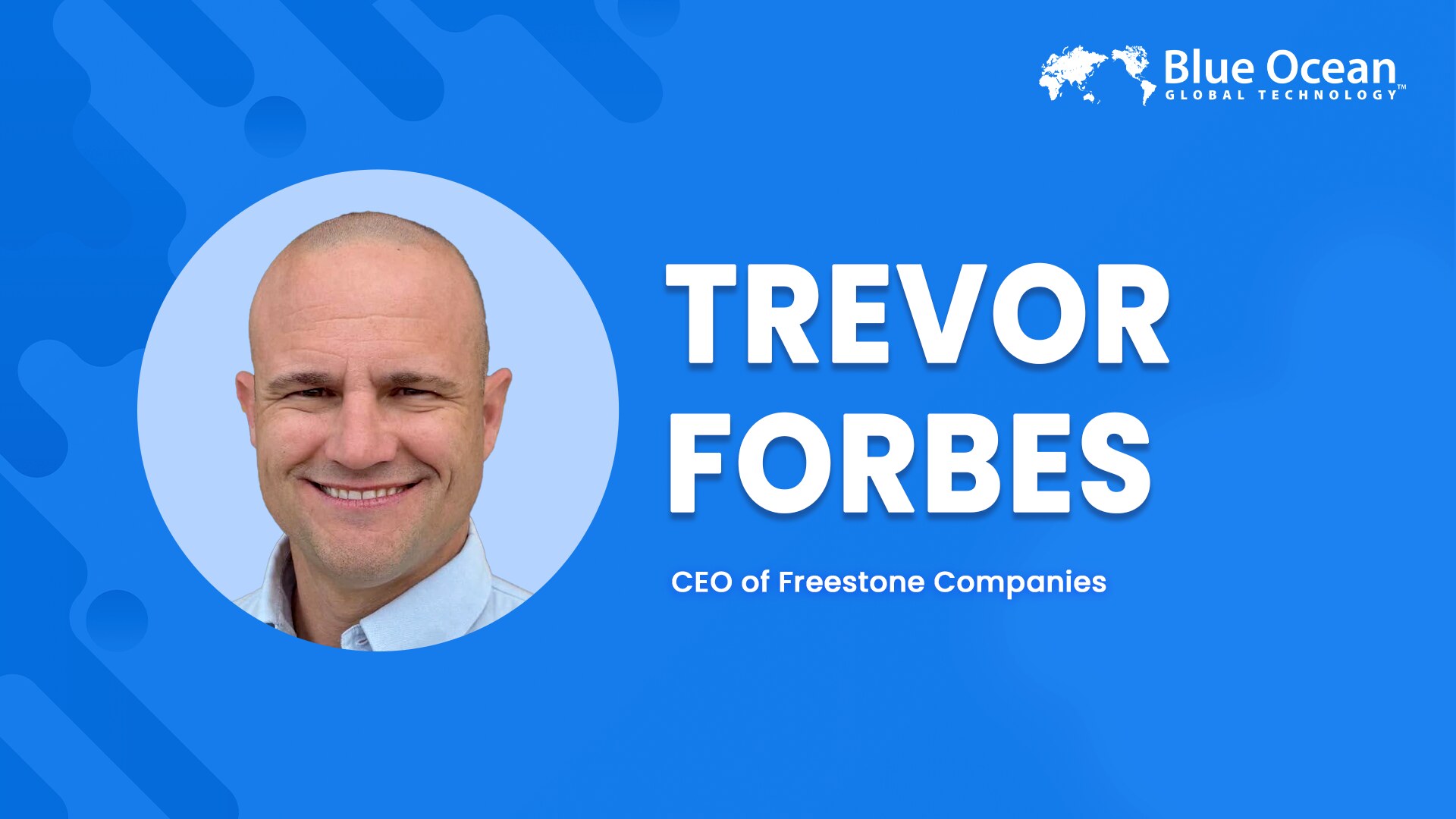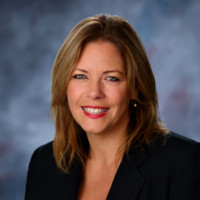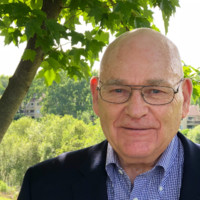About Trevor Forbes

Trevor Forbes, CEO of Freestone Companies, is a seasoned business executive with a background rooted in logistics and strategic acquisitions. He served seven years as President, and then CEO at Summit Vehicle Solutions. Under his leadership, the company experienced exponential growth, with EBITDA growing 6-fold through organic growth and strategic acquisitions. Trevor’s leadership and established expertise extends to Grant Street Investments, where he serves as both partner and investor. Drawing from deep industry insights, he also serves on the board of Peak Auto Auctions. Trevor holds a B.S. in Mechanical Engineering from Texas A&M University and an MBA from the Tuck School of Business at Dartmouth.
Insights and Daily Life
Blue Ocean: Please tell us a bit about yourself.
Trevor: I’m originally from Texas. After college, I spent six years in the Marine Corps, focusing on logistics operations, and later served as a counterinsurgency officer. I went on to business school at Dartmouth and then raised a traditional search fund, which eventually led me to run a business called Summit Vehicle Solutions for about seven years.
During that time, my partners and I also began doing some traditional search fund investing. We sold Summit Vehicle Solutions in 2024, and since then, I’ve raised additional capital, including my own, to acquire another business to run. Currently, I spend most of my time managing Freestone Companies. I also still dabble in traditional search fund investing with my previous partners from Summit Vehicle Solutions. I have a wife and two little girls, and in my free time, I enjoy hunting and fishing. While I engage in various investment activities, I wouldn’t classify myself as a private equity investor in a technical sense.
Blue Ocean: Tell us about your professional life. Why did you choose to be a Private Equity Investor?
Trevor: What I do involves investing private equity into companies, which is technically accurate. However, my approach is much more entrepreneurial and operationally focused. We do buy companies, but our primary method of creating value is by personally running and operating those businesses, growing them organically, making tuck-in acquisitions, and enhancing their overall value. I actively serve on boards where I mentor young CEOs to help them do the same.
In essence, I view myself as a business operator and entrepreneur who utilizes private equity—not just as a passive investor, but as someone who actively engages in the management and growth of the companies we acquire.
During my time in the Marine Corps, I had more responsibility and leadership opportunities at a young age than most 20-year-olds after college, and I found that I enjoyed it. I love leading teams, building things, and being directly involved in operations. My passion for business, people, and teamwork has driven me toward this career path. Ultimately, my desire to run companies is what led me here, with buying companies being a necessary step to achieve that goal.
Blue Ocean: What does your typical day look like?
Trevor: I start my day early with a workout. If I don’t have to drop my daughter off at school, I aim to arrive at the office by 8 am. Once I’m there, I review my calendar and prioritize my tasks. I like to break my work down into smaller tasks, tackling administrative duties first. After that, I handle calls with investors or target companies and engage with prospective business sellers. Later in the morning, I meet my business partner, Matt, to discuss strategy and potential investment opportunities. In the early afternoon, if I have time, I take a break for a run before diving into analysis work related to one of our investment theses. The rest of the afternoon is spent sending follow-up emails and addressing any requests from my partners. I try to wrap up my day and get home by 6 pm, where I enjoy dinner, watch TV with my wife, and help put the kids to bed.

Trends and Value in Private Equity
Blue Ocean: What is one trend from your industry that excites you?
Trevor: I believe skilled blue-collar workers are becoming increasingly scarce. I’ve noticed that industries relying heavily on blue-collar labor often gain a competitive edge in attracting and retaining talent. This strategic advantage allows them to retain better talent than their competitors, enhancing their overall performance and stability.
Blue Ocean: How have you differentiated yourself and what underpins your success?
Trevor: I believe that being a hands-on leader has shaped my focus on blue-collar industries, which typically have large workforces that require significant hiring, mentorship, and training. My background plays a big role in this—I grew up in a working-class family, and my experience in the military further solidified my understanding of these environments. This background allows me to relate to my employees better than some in my position, which I think contributes to our success.
I try to place myself and my teams into businesses where we fit in culturally, and I believe that alignment helps us grow and thrive. There’s a reason I don’t run software companies: I don’t have an edge when it comes to working with software engineers. However, I do have an edge when it comes to working with truck drivers and other blue-collar professionals. This hands-on approach has been key to the success of the businesses I’ve operated.
Blue Ocean: What is something unique you offer your clients?
Trevor: At Freestone Companies, we don’t have traditional clients; instead, we seek out owners who have great businesses they want to sell. What we offer them is a real opportunity to retire. The conventional private equity model often requires sellers to roll over equity and stay on as employees, which can be a tough transition. After running a business for decades, many owners, especially those in their 60s, aren’t interested in reporting to a younger private equity professional. We provide an alternative: we buy their business and offer them a consulting role or a position on our board, but they won’t be our employees – they will be our paartners. They can sell their business and move on to whatever they choose.
Another key aspect is our 10-year investment horizon. We plan to run the business for a decade, so we don’t focus on short-term cuts or squeezing immediate returns. This long-term perspective allows us to reinvest in the business and its people. For us, employees aren’t just spreadsheet line items; we’re actively involved in the company, building genuine relationships. We get to know our employees, and their families, and foster a sense of community. This approach resonates with owners who have built their companies and teams over many years. In terms of stewardship and a long-term investment philosophy, I believe these qualities differentiate us in the market.
On the side, as a search fund investor, I engage with entrepreneurs looking to buy and run their own companies. The investor community is increasingly made up of individuals who may not have run businesses themselves, which can be valuable. However, for young entrepreneurs in their early 30s, having mentors who understand the challenges of running a business—like firing employees or navigating difficult conversations—is incredibly helpful. Even when things go well, the journey can be a roller coaster. My partners and I have all run businesses ourselves; we see ourselves as business operators and entrepreneurs first, with investing as a secondary focus.
Trevor Forbes, CEO of Freestone Companies
Key Achievements and Career Highlights
Blue Ocean: What is an achievement in your personal or professional life that you are proud of?
Trevor: I can think of an employee from our previous business who now runs one of the companies we sold. He started out as a tow truck driver, and he’s incredibly talented, smart, and has a strong leadership ability. Today, he’s managing a multi-million dollar profitable business and is growing it dramatically. I believe he’ll eventually become the CEO of that company. While it’s 99% him and his hard work, I’m proud of the role I played in recognizing his potential early on and helping to position him for success. Watching him develop into the leader he is today has been rewarding, and I’m grateful for the small part I contributed to his journey.
Blue Ocean: What is the most memorable moment of your career?
Trevor: One period that really stands out for me was during COVID. It was a challenging time, especially because we had just bought a business in Texas when the pandemic hit. The business was already struggling, and then COVID made things even more difficult. Since our work involved physical operations, remote work wasn’t an option, so I had to be there in person.
During that time, my wife was pregnant, and with so much uncertainty surrounding COVID, we decided to be very cautious. As a result, there was a stretch of about 13 or 14 weeks where I didn’t see my family at all. It was a crazy time, trying to keep everything on track while being away from home.
Life Lessons and Personal Interests
Blue Ocean: What is something you are grateful for?
Trevor: I’m incredibly grateful for my wife. Being an entrepreneur and running a business is a challenging, often overwhelming endeavor, and it would be nearly impossible without a supportive partner. Her encouragement and understanding of the long hours I put in have been invaluable. I know that without her support, I would have had to take a different path in life—one that would likely be less fulfilling. I truly appreciate everything she does and the role she plays in my journey.
Blue Ocean: What advice would you give your younger self and other young people aspiring to pursue a career in investing?
Trevor: As I mentioned earlier, I don’t primarily think of myself as an investor; that’s more of an ancillary aspect of what I do. If I were to advise my younger self or anyone aspiring to run companies, I’d say don’t try to take shortcuts. Seek out opportunities early on to gain real leadership experience. Work in a small or medium-sized business, even if the title isn’t glamorous and the pay isn’t on par with an investment banking or consulting role. The hands-on experience you gain—interacting with people, managing personalities, and making real decisions—is something you can’t replicate in an MBA program. Sure, you can learn to build financial models in school, but that practical experience is invaluable.
Another piece of advice I’d offer is to gain experience in sales. Even if you don’t see yourself as a salesperson—and I don’t—much of your role will involve selling to customers, investors, and, importantly, your employees. You must persuade great talent to join your team and convince them to stay. You’re also guiding your team along the path you’ve laid out, which is essentially a sales job. Having early experience in sales can be incredibly beneficial. Good salespeople are often defined by their persistence. Sales involve hearing “no” repeatedly and not giving up until you finally achieve a “yes”. Building that resilience and grit in your 20s will serve you well later on because much of business is about navigating those challenges and keeping after them despite setbacks.
Blue Ocean: What are your sources of inspiration?
Trevor: In our investment community, I draw inspiration from a mix of individuals, particularly those who are a generation or two ahead of me, many of whom are in their 60s. These individuals are inspiring because they have successfully run multiple businesses over time, honing their leadership abilities and deepening their understanding of small business operations.
The prospect of becoming like them one day motivates me. I also find inspiration in those who have faced setbacks but persevered. Many of my close contacts in the community have experienced both success and failure, yet they continue to push forward with persistence and grit. Their resilience is truly motivating. Having mentors and peers in our tight-knit investment community who have stayed committed to this path for many years, weathering successes and failures, inspires me. They provide a tangible target to aim for over the next 10 to 20 years.
Blue Ocean: Outside of work, what passions or interests do you pursue?
Trevor: I have a few hobbies that I pursue very passionately. I really enjoy hunting big game like elk and deer in the mountains. I also spend some time fly fishing with my business partner.
Blue Ocean: Please share your favorite quotation
Trevor: “Search the parks in all your cities, you will find no statues of committees.”
-David Ogilvy
Conclusion
Trevor Forbes discusses his path as an entrepreneur who prioritizes active leadership in blue-collar sectors. His method in private equity focuses on directly managing businesses and enhancing their long-term worth. Outside of his professional life, he enjoys fly fishing and hunting, reflecting his dedication to maintaining balance. As he advances in his career, Forbes is committed to supporting talent and creating a positive workplace culture.
Do you have a personal or professional story that can inspire other people into becoming the best version of themselves?
You are welcome to share your journey with our audience.









